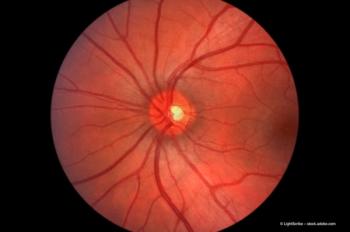
Efficacy of pegcetacoplan in geographic atrophy: OAKS and DERBY phase 3 results
Dr Nathan Steinle discusses top-line results of the OAKS and DERBY trials, testing the efficacy of pegcetacoplan for the treatment of geographic atrophy.
On October 11, 2021, Dr Nathan Steinle presented his talk entitled, “Efficacy of Intravitreal Pegcetacoplan in Geographic Atrophy: Results from the Phase 3 DERBY and OAKS Trials,” at the American Society of Retina Specialists 39th Annual Scientific Meeting in San Antonio, Texas.
Dr Steinle practices at California Retina Consultants in Santa Barbara, California.
Video transcript
Nathan Steinle, MD: So my name is Nathan Steinle, and I'm of California and consultants in Santa Barbara, California.
So it's exciting to be here in San Antonio for ASRS and presenting top-line data for both OAKS and DERBY. These are the two very large registration trials for Apellis, looking at their molecule, pegcetacoplan, and the treatment of geographic atrophy. And the top-line results get kind of interesting.
You have OAKS, and you have DERBY. Both of them have about 600 patients in each trial, looking at either monthly dosing of pegcetacoplan, or every-other-month dosing of pegcetacoplan compared to monthly and every-other-month sham, so the monthly, every-other-month versus sham in both OAKS and DERBY.
These are identical trials. They are, you know, everything you want: multicentred, sham-controlled, and they should hopefully lead eventually to the possible approval of this drug pegcetacoplan for the treatment of geographic atrophy.
As far as the results go, it gets kind of complicated. In OAKS, both monthly as well as the every-other-month dosing met its primary endpoint of being significant reduction in GA progression at the one-year mark. Whereas in DERBY, both the monthly and the every-other-month dosing just barely missed, from a statistical standpoint, the primary endpoint at the one-year mark. In fact, the monthly dosing just missed the significant p-value as this p-value was .0528. So just missed it at the one-year mark.
What we showed here then is a pooled analysis, which is a pre-specified outcome. And it showed at the one-year mark, if you pooled both OAKS and DERBY, it is highly statistically significant when you pool all those patients together at the one-year mark, both the monthly and every-other-month dosing of pegcetacoplan.
And the final analysis we showed here, which is new and never been shown before, was the fellow eye effect. If you think about it, in both OAKS and DERBY, we’re comparing it to a sham pool of patients. But what better control than your own internal eye? And so we went back and looked at patients who had qualified with both eyes for OAKS and DERBY and said, hey, one eye got treatment, one eye did not get treatment—how did the non-treated eye do versus the treated eye internally in these same patients?
And we showed the results here, but there's a robust separation of the curve, especially in the monthly dose patients with pegcetacoplan. So if the patient got monthly therapy and one eye and no therapy in the other eye, there was robust separation of the curve that was highly statistically significant at the one-year mark, which gives further evidence this drug really does work.
The American Society of Retina Specialists (ASRS) hosted its 39th Annual Scientific Meeting from the 8th to the 12th of October, 2021, at the JW Marriott San Antonio Hill Country Resort and Spa in San Antonio, Texas.
According to ASRS, its 2021 scientific programme offered attendees innovations in retina science, clinical practice and surgery with 148 papers, 165 posters, 46 papers on demand, and 69 films, as well as a wide range of networking opportunities and the chance to exchange ideas and perspectives with peers.
Related Content:
Newsletter
Get the essential updates shaping the future of pharma manufacturing and compliance—subscribe today to Pharmaceutical Technology and never miss a breakthrough.




























